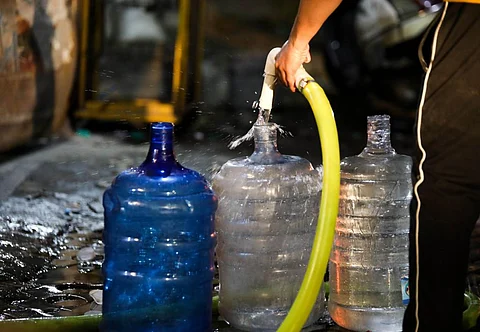

As temperatures soar across the state, health authorities in Karnataka are on high alert over a potential surge in cholera cases.
The state has reported 33 confirmed cases of cholera as of April 23. As many as 17 were reported from within the Bruhat Bengaluru Mahanagara Palike limits, 14 of them between April 1 and 21.
The Bengaluru Urban District reported 10 cases this year, including eight in April alone; Mysuru district reported three cases in April; Kolar and Koppal districts each reported one case this year.
In response to the looming threat, Commissioner D Randeep of the State Health and Family Welfare Department has issued a comprehensive circular outlining preventive measures to all district health and family welfare officers.
The circular outlined the stringent actions and protocols that must be implemented immediately to curb the spread of cholera. Randeep instructed officials to ensure the availability of antibiotics, intravenous infusions and oral rehydration solutions. Additionally, he has mandated the establishment of 24x7 makeshift clinics to address emergency situations that may arise. Regular testing of water samples for coliform bacteria, faecal urine tests, and sensitivity tests have also been ordered to be conducted at district public health laboratories.
“In the event of a positive cholera diagnosis from stool samples, district surveillance officers are required to kickstart local surveillance without delay,” Randeep said. He further emphasised the importance of reporting each case promptly on the Integrated Health Information Platform (IHIP) and ensuring continuous follow-ups until patients have fully recovered.
District health and family welfare officers should spearhead awareness campaigns about the symptoms and preventive measures of diarrhoea and cholera, the commissioner noted in the circular. “Local health workers must be equipped with practical training to effectively manage and contain any potential outbreaks.”
The notice encouraged collaboration with other government agencies to guarantee a steady supply of clean drinking water to residents, which is crucial for preventing water-borne diseases like cholera. Food and water samples at large public events must be tested regularly to curb the spread of the disease at such gatherings, the commissioner urged.
BBMP officials are now cracking down on the sale of cut fruits in open markets. Vendors are being directed to cease this practice immediately, with health officers overseeing compliance and championing sanitary standards.
Cholera is a serious diarrhoeal disease resulting from consuming contaminated food or water, according to the World Health Organization (WHO). If untreated, it can be fatal within hours. This disease is often associated with areas lacking clean water and sanitation facilities, underscoring its ties to poverty and inadequate public health services.
WHO data suggests there are 1.3-4 million cholera cases globally each year, leading to 21,000-143,000 deaths. The risk is particularly high in overcrowded and unsanitary environments, often found in places with poor sewage and waste disposal systems that pollute food and water sources.
Consuming raw or undercooked shellfish can also introduce cholera bacteria, potentially causing infections. Additionally, using unclean water for agriculture or food preparation can trigger cholera outbreaks.
Symptoms such as severe watery diarrhoea, vomiting and muscle cramps typically manifest within two to three days after exposure. In severe cases, rapid fluid and electrolyte loss can lead to dehydration, shock and potentially fatal consequences if not treated promptly.
Diagnostic tools like microscopy, stool cultures and RT-PCR tests are commonly employed to detect cholera. Treatment focuses on rehydration and electrolyte replacement to counteract fluid loss and prevent dehydration.
Methods like filtration, chlorination and boiling can remove cholera bacteria from water. Regular hand washing with soap and water, especially before eating and after using the toilet, is essential for preventing transmission. Adhering to proper food safety practices, such as washing fruits and vegetables thoroughly and avoiding raw or contaminated foods, is also vital.
Health officials stressed the importance of public health interventions, including targeted vaccination efforts in high-risk areas and community outreach programmes focused on cholera prevention. These measures are essential for containing outbreaks and minimising the impact of cholera-related illnesses and fatalities.
“We are taking every preventive method to tackle cholera,” Bengaluru urban district health officer Ravindranath Methi told the newspaper Hindustan Times. “ASHA workers were instructed to visit houses periodically to check epidemic disease symptoms among people. Pamphlets distributed to create awareness along with providing safety measures information.”
The silicon city, which has a population of around 14 million, has more than 10,000 paying guest accommodations, according to an estimate. In response to the latest cholera outbreak, the Paying Guest (PG) Owners’ Association has developed guidelines to safeguard residents. These guidelines emphasised hygiene protocols to minimise the spread of the disease.
PG proprietors are rolling out specific initiatives such as frequent cleaning of living areas and kitchens, adding reverse osmosis water filtration units and offering hot meals to deter residents from eating out. They’re also emphasising regular health checks for residents and encouraging those with symptoms to notify management promptly.
BBMP has issued guidelines for establishments. Hotels, eateries, and cafes are now required to serve complimentary hot water to customers. Moreover, both private and government healthcare institutions must report potential cases to IHIP.
In light of rising concerns about infectious diseases, the Bangalore Water Supply and Sewerage Board is ensuring water facilities are properly chlorinated. Health department teams are collecting samples from sewage systems in affected areas, addressing water infrastructure issues and taking the necessary steps to contain outbreaks.